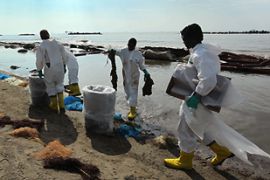Obama defends oil spill response
US president says administration is “in charge” of response to Gulf of Mexico spill.

Obama ignored charges that the spill was “his Katrina,” a reference to former president George Bush’s poor handling of Hurricane Katrina, the deadly 2005 storm that decimated the city of New Orleans.
| in depth | |
|
He told reporters history would judge his response to the oil spill.
But the US president acknowledged that the government simply was not prepared to handle a disaster of this magnitude.
“There was a lack of anticipation about what the worst case scenarios would be, and that was a problem,” he said.
‘Top kill’ progress
US Coast Guard officials say BP’s latest effort to plug the well has stopped the flow of oil, at least temporarily.
The British energy giant began pumping heavy mud into the gusher on Wednesday, a process called the ‘top kill.’ The company hopes that the mud will cap the steady stream of millions of litres of oil.
| In video |
|
Al Jazeera’s Anand Naidoo reports on economic and environmental risks facing Florida Keys |
Thad Allen, the head of the Coast Guard, said early on Thursday that oil is no longer coming out of the well. But he said the well still has some oil pressure, which could theoretically cause a weak spot in the pipe to explode.
BP will now pump cement into the well to permanently seal it off.
Lisa Novak, a spokeswoman for the Coast Guard, later said that Allen “did not declare success.” But “things are going according to plan,” she said.
BP officials struck a more cautious tone. Speaking on Friday, the company’s CEO, Tony Hayward, said it will be 48 hours until BP knows whether the procedure was successful.
MMS director resigns
Meanwhile, Liz Birnbaum, the head of the Minerals Management Service (MMS) – the US agency which oversees offshore oil drilling – announced her resignation on Thursday.
Birnbaum’s agency has been heavily criticised in recent weeks for its close ties with the oil industry.
A report from the agency’s inspector general, released earlier this month, documented MMS employees accepting gifts from oil companies and allowing workers on drilling platforms to fill out their own inspection reports.
Obama criticised the agency last week for having a “cosy relationship” with industry.
“I’m surprised it took this long,” said Tyson Slocum, the director of Washington-based Public Citizen’s Energy Programme, referring to Birnbaum’s resignation.
“Her agency took too much of a permissive role in trying to regulate the oil industry. It’s clear that there are incestuous relationships within that agency.”
Ken Salazar, the US interior secretary, called her a “good public servant” during testimony on Thursday before the US House of Representatives.
Frustration
BP’s fresh attempt to contain the spill comes as fishermen, hotel and restaurant owners, politicians and residents along the coast become frustrated over the company’s previous unsuccessful attempts to stop the leak.
The leak began after an offshore drilling rig exploded on April 20, killing 11 workers.
By the most conservative estimate, 26 million litres of crude have spilled into the Gulf, fouling Louisiana’s marshes, coating birds and other wildlife and curtailing fishing.
But US officials say the actual tally could be much higher. At a congressional hearing on Thursday, the head of the US Geological Survey estimated the flow at up to 19,000 barrels of oil (3 million litres) per day.
The US coast guard approved the mud injection on Wednesday after scientists ran a series of diagnostic tests to determine whether the procedure could work – or if it could potentially make the leak worse.
